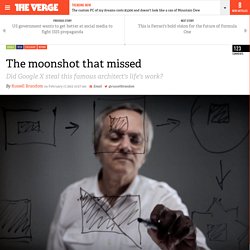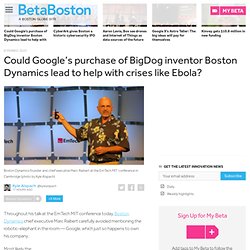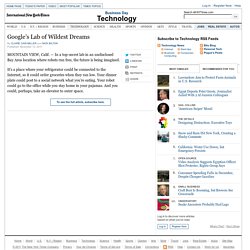

The moonshot that missed. What was the goal of Project Genie?

According to Attia, the goal was to simply translate the Engineered Architecture system into software. Through his lawyers, Attia quotes Teller saying, "[Eli] invented the technology, and he's here to translate his brain into software. " Attia didn't have the software expertise or business infrastructure to make Engineered Architecture into a successful software product, so he looked to Google X to provide it.
Given his considerable fame as an architect, he expected to be calling the shots on the architecture side. Google and Flux haven’t filed any legal answer to Attia’s complaint, but the team seems to have viewed Genie differently, with Attia’s tools as just one of many avenues to follow. The evolution of Project Genie may have also put it at odds with the rest of Google X. But it wasn't entirely the end. The signs were clear enough. The new company was called Flux Factory, with Chim as CEO and Teller serving on the board. Could Google’s purchase of BigDog inventor Boston Dynamics lead to help with crises like Ebola?
Throughout his talk at the EmTech MIT conference today, Boston Dynamics chief executive Marc Raibert carefully avoided mentioning the robotic-elephant in the room — Google, which just so happens to own his company.

BigDog Most likely the stealth tactic is coming from Google—the tech giant’s name is nowhere to be found on the site of Waltham-based Boston Dynamics, either. But it could also be a sign of Google’s willingness to allow the groundbreaking, 22-year-old company to keep doing its thing, with relative independence. Boston Dynamics, if you don’t recognize the name, is the maker of robots you’re probably familiar with thanks to YouTube. The MIT spinout has developed a number of human- and animal-like bots—including BigDog—that can walk, climb, and keep their balance when kicked. Google acquired Boston Dynamics in December, in what was seen by many as an odd move, since the firm mostly makes robots for the military. 5 True Facts about Google X! At Google X, a Top-Secret Lab Dreaming Up the Future. It’s a place where your refrigerator could be connected to the Internet, so it could order groceries when they ran low.

Your dinner plate could post to a social network what you’re eating. Your robot could go to the office while you stay home in your pajamas. And you could, perhaps, take an elevator to outer space. These are just a few of the dreams being chased at X, the clandestine lab where Google is tackling a list of 100 shoot-for-the-stars ideas. In interviews, a dozen people discussed the list; some work at the lab or elsewhere at Google, and some have been briefed on the project. Although most of the ideas on the list are in the conceptual stage, nowhere near reality, two people briefed on the project said one product would be released by the end of the year, although they would not say what it was. “They’re pretty far out in front right now,” said Rodney Brooks, a professor emeritus at M.I.T.’s computer science and artificial intelligence lab and founder of Heartland Robotics.
Shape the Future: Astro Teller explains how Google X works. The Truth About Google X: An Exclusive Look Behind The Secretive Lab's Closed Doors. Astro Teller is sharing a story about something bad.

Or maybe it's something good. At Google X, it's sometimes hard to know the difference. Teller is the scientist who directs day-to-day work at the search giant's intensely private innovation lab, which is devoted to finding unusual solutions to huge global problems. He isn't the president or chairman of X, however; his actual title, as his etched-glass business card proclaims, is Captain of Moonshots--"moonshots" being his catchall description for audacious innovations that have a slim chance of succeeding but might revolutionize the world if they do. It is evening in Mountain View, California, dinnertime in a noisy restaurant, and Teller is recounting over the din how earlier in the day he had to give some unwelcome news to his bosses, Google cofounder Sergey Brin and CFO Patrick Pichette.
Failure is not precisely the goal at Google X. X does not employ your typical Silicon Valley types. But in some ways that makes sense. Google X. Google X. Google x - News & Rumors.